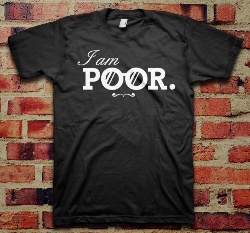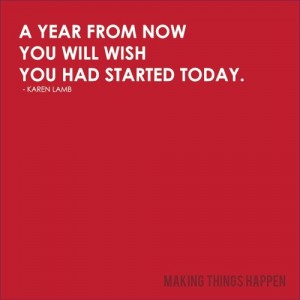Gain Command & Control Now – Building Wealth Tip No.1
18 Feb 2012 4 Comments
in 33rd Birthday Reflections, Building Wealth Tips, Pwn All The Things
Prologue: Since October of 2011, I have been posting a series of reflections on some of the most important lessons I learned the hard way over the past year. I published the first of these shortly after my birthday regarding the fine line separating the utterly depressing from the categorically awesome, arguing that we should relentlessly pursue the latter as if our lives depended on it (because they actually do). A few weeks later, I shared a second reflection addressing the common misconception that working hard is enough, asserting that we will only be substantially rewarded for bringing something of clearly discernible value to a given state of affairs and not for our efforts alone–a truth so obvious that we constantly miss it and suffer accordingly.
While considering which topic to address next, I received a bunch of requests for input on personal finance. I learned my most difficult lessons in this area a few years ago. Nevertheless, I’m interested in writing about stuff that is helpful to others whether or not it fits perfectly with my outstanding plans for blogging. So, I guess one can take all of the posts in this category of “Building Wealth Tips” to constitute a nice, multi-part lesson cross-listed in that category of those “33rd Birthday Reflections,” just in case anybody is keeping score.
Finally, I’ve noticed that a lot of people get spooked from substantial discussions about personal finance because so many of these discussions are 1) ridiculously focused on bean counting, 2) nowhere close to being comprehensively instructive, and 3) lacking hardcore, scientific support for the activities they so passionately promote. Instead, I’ll begin with a personal story and gradually work my way towards some nuts and bolts mechanics of the discipline, thoroughly citing the main things I want to share as food for thought. I figure that anybody reading this blog who wanted a bunch of arithmetically fixated information right out of the gate or a collection of disassociated financial pro-tips will have looked elsewhere already. There’s something else “in the way” for a lot of us when it comes to really gaining financial strength, and my goal with this post is to obliterate that obstacle as much as possible.
Also, I’ve never shared this story with anybody before. So, I hope it provides some insight for you.
~

F. Scott Fitzgerald may have been one of the most impactful American authors of the 20th century, but his weak command of personal finance still ruined his life.
I packed my last suitcase and slung two ill-fitting blazers over my left shoulder. The pine trees framing my dormitory window fragmented beams of late-afternoon sunlight, dribbling their golden rays across my face in piecemeal obscurity as the day’s events disturbed my hopes for what lay ahead. I was partway through a graduate course of study at Princeton Theological Seminary with a vaguely defined career goal, a sharply reinforced cost, and a path almost perfectly opposed to Fitzgerald’s Amory. I knew that God was still alive and kicking in my heart, that wars worth fighting abounded, and that there was some good in humanity still. But I was just moments away from the abrupt realization that I did not know myself as surely as I thought. And I was completely embarrassed to learn this lesson through what seemed like the most base catalyst possible: Money.
I had just signed a promissory note for another several thousand dollars of student loans, a process required by my school every year seminarians wanted to avail themselves of such an opportunity to offset the cost of their education. And despite the fact that I had concluded that such a thing was “good debt,” I had never come close to possessing a tenth of what I now owed. Plus, I still had another year and another round of loans to go. Having grown up just above the poverty line, nobody from whom I had received financial counsel in the past could speak compellingly to my situation. I had been taught to avoid all debt like the plague, but I recognized that the net effect of achieving a more substantial education earlier in my life, likely leading to a higher level of compensation for my labor, was the more mathematically sound way to go. Moreover, none of the people who had so thoroughly impressed upon me the importance of avoiding all debt were particularly wealthy, which either meant that it was impossible to grow legitimately wealthy in one’s lifetime that way (a demonstrable falsity) or that there was something fiscally wrong with their perspective.
In short, math and logic were picking a fight with my upbringing. And while I knew that logic and math told no lies, I hadn’t risked anything this gutturally important on them since that one time I won a bet about calculating the velocity at which a drunken friend would strike a submerged refrigerator after leaping from a bridge suspended a certain height above a river–thanks to integral calculus. Delaying my education until I could afford to pay for it out of pocket with money squirreled away from whatever job I worked in the meantime deferred an increase in my earning potential, an increase great enough to easily outstrip the cost of financing the aforementioned loan. But more importantly, such a delay prevented me from pursuing the sort of work I wanted sooner by definition, which also postponed all sorts of life-events, relationships, and complimentary endeavors connected to that work. This made my student loan a type of investment in myself enabling a swifter, more impactful benefit for the people and projects what would be positively impacted by my own growth. And since this was a federally subsidized loan under consideration, there were all sorts of advantages and protections woven into the system amplifying the smartness of incurring that debt despite the inherent risk that even the most worthwhile investments carry.
Simple call, right? Wrong–I panicked.

In grad school, I was too poor to justify buying this shirt that retails at $25 from playwho.com. Oh, the irony...
I looked for every feasible way I could whittle down my expenses to as close to nothing as possible. I ate fewer meals and guiltily sneaked cereal out of my dining hall for breakfast the following morning. I bought no clothes, which made me horribly dependent on the good graces albeit risky stylistic conjunction of holiday presents. I spent hours researching the most inexpensive versions of the class texts I was forced to buy when repeatedly checking them out at the library would not suffice. I rued the fact that I could not afford to take a lady I fancied on anything but an utterly cheap date–all the while not picking her up in the car I did not posses because I was too freaking penurious to purchase a decent vehicle, let alone maintain one. And while thrifting and cycling were all the rage among the graduate student set in my hometown of Chicago, this approach was not generally well received or advised at Princeton.
Deep inside, I sensed that all my efforts at frugality were insignificant. I was sure that I needed to substantially cut a major cost. And dormitory housing coupled with a mandatory meal plan was my single, largest expense category. So, I made a painful decision to mitigate that by taking a job as a resident manager of an institutionally affiliated conference center off the seminary quad, enabling me to effectively zero-sum rent, food, and part-time pay. While that probably sounds like a brilliant idea, I said “painful” because the life of an aspiring theologian at Princeton was frequently, deeply lonely for reasons I’ll probably get around to describing some other time. Healthy, robust community was rare and difficult to cultivate even living on campus, let alone removed from it, and it was not just something I craved but something I wanted to be able to give to others at the core of who I was.
Cultivating robust, healthy community where people could grow and support one another to their mutual benefit was a central, guiding principle of the life I wanted to live. Being able to engage in this project more effectively on the far side of seminary was one of the main reasons I chose to pursue that course of training in the first place. Thus, my aforementioned financial “solution” functioned as a shift of expense from finance to purpose and ethics. In fact, it risked a net loss of “wealth” defined not just as one’s fiscal wherewithal but also the strength of one’s key relationships, long term prospects, freedom, security, and so forth. My solution threatened a conflict with who I wanted to be, what I wanted to do, and what I knew that both my colleagues I needed at that stage of our lives. But there was no way to ascertain whether the benefits of this shift would be worth the cost apart from giving it a shot and finding out. And since the whole idea of a seminary education boiled down to an investment in me, my own lack of confidence in myself effected a recursive loop of irritatingly pitiful consternation.

A shot of me with my dad around the time of the events described by this post outside the main classroom building at Princeton
I planned a final departure from my dormitory when most other students were taking their evening meal to avoid encountering anyone who might probe the turmoil I feared I could not keep from surfacing. I strode briskly through the autumnal dusk across the deserted quad. And while I was somewhat tired from previous trips carting boxed-up belongings to and fro, I felt something other than mere fatigue silently approach me from the darkening woods lining my path. If you’ve ever blacked out from standing up too fast, felt your stomach drop whilst peering over a momentous ledge, or sensed a tingle run through your limbs before executing an exciting but also terrifying feat, you know about the sensation. You’ve felt everything around you slow down. You’ve become hyper-aware of your own processing of whatever’s confronting you, and your mind has raced with abnormal clarity to exhaust all available options towards some eureka-like conclusion by brute-force if necessary.
And that’s when something within me finally broke.
I felt dazed and moved to tears and short of breath and stymied and somehow also somewhere else from everywhere I had ever been before. I muffled myself as much as possible until I could duck behind the closed doors of my destination and began to sob uncontrollably. I felt caged and exposed all at once. I caught a glimpse of myself in the mirror, looked vaguely unrecognizable, and began to wonder whether professional counseling or psychopharmacological intervention were in order. I was sick of carrying the tension of trying to figure out something that should have (obviously) been so easy to resolve as a few thousand dollars owed by a young, able-bodied, single man with half a brain in his head. And that tension had finally shattered something I carried deep inside me.
I not only believed in a God commanding the floodgates of heaven but had so frequently witnessed this God provide for people in completely mundane and thoroughly surprising ways by turns that I had chosen to devote my life to guiding others to worship and be liberated and renewed and flourished through a loving relationship with that God. I had traveled the world, helped save people’s lives, witnessed vistas of penetrating beauty, loved, lost, and lived more at twenty-something than many do by the time they depart this mortal coil. I was supposed to be made of stronger stuff than this. But no matter what I knew, said, or did, I could not escape the fact that around twenty-something-thousand dollars of debt was all it took for me to completely flip out.
How embarrassingly weak and conflicted and immature it seemed I truly was.
~
Over the subsequent years, I also learned to give myself a break rather than merely suffer from one. I gradually realized that I had encountered something back then that has only lately occurred for a lot of people, and this is the interior experience of the catastrophe of a financial worldview of insidious nature, a background subroutine of total maleficence propagated as conventional wisdom. Despite achieving an undergraduate degree with highest honors in four different, bankable foci, despite gaining admission to the most selective seminary in America, I had never taken a single, comprehensive course in personal finance–nor was I required to do so at any stage of my formal education. The closest I came to something like that was a merit badge I earned along the path to become an Eagle Scout as a teenager–thank God for the BSA at least. But I had never encountered anything strong enough to course-correct for this pervasive coadunation of fiscal claptrap coupled with a progressively greater dependence on a resulting web of economic misbelief ensnaring the vast majority of people I know today.
I was a smart, hard worker in general, but that no more guarantees financial health than being born rich–a lack of soundly applied fiscal principle can easily decimate both and, in fact, does just that with cold regularity every single day. Most unfortunately, my abysmal level of financial literacy at that time is the norm for America. Unless you are one of the lucky few, you probably received a terrible financial upbringing, too. It doesn’t matter if your parents were responsible, generous, and involved with your life (like mine) or if you had to figure everything out completely on your own, either. To depart from personal narrative for the sake of statistically broader applicability, consider that:
- Just 25% of American adults claim that they are satisfied with their “personal financial condition.” Moreover, we are used to living this way; we are comfortable with being for the most part oblivious about how to improve our financial condition even though we don’t like where we are.
- About 66% of American high school students participating in a country-wide survey by The National Council on Economic Education flunked a basic economic literacy test, with 49% of adults surveyed failing similarly.
- Lacking the ability to work our way towards managing greater wealth, we try to live as if we already possessed all the benefits of this process through credit. Total American consumer debt topped the $2.43 trillion mark in May 2011, i.e. roughly 16% of our gross domestic product. This correlates with the 2010 figures for the United States’ public debt-to-GDP ratio of 102% compared to healthier economies like Germany’s at 78.8% or Norway’s at 48.9% or New Zealand’s at 30.3%. Translation: We are taking on progressively greater levels of private debt, and we are becoming statistically less likely to pay back the debt our government is incurring. Our inability to find a solution for the latter issue is precisely why Standard & Poor downgraded the United States’s credit rating for the first time in history in August 2011.
- Moreover, Americans now hold roughly $772 billion in credit card debt alone, and we typically underestimate our credit card debt by around 33% of the actual figure that we owe. That’s how accustomed we have become to poor financial principle coupled with living on credit.
- Despite the above, children’s spending has roughly doubled every ten years for the past three decades, and it tripled in the 1990’s. Paired with this trend, more than 1 in 5 youth ages 12 to 19 have their own credit cards or have access to their parents’ according to The Jumpstart Coalition’s research on the matter. Since we are becoming less fiscally adroit with every generation, this means that we are literally setting up our children for personal financial disaster, bit by bit and day by day with every ounce of negligence and penny hocked on credit.
- And out of control credit card abuse is just one indicator of the problem. In the month of December 2011 alone, total consumer credit grew by $19.31 billion, more than twice the $7.7 billion increase expected by Reuters analysts to yield the single largest jump in ten years for non-revolving credit, which covers categories of debt like auto and student loans.
- Despite the fact that almost all of us know we’re supposed to cultivate sound habits of saving, our actual rate of savings has steadily declined for over thirty years regardless of the state of the overall economy–that is the power of a weak command of building and managing wealth. In fact, our aggregate rate of savings recently dropped all the way to 0%–as a group, Americans saved nothing whatsoever–from a high of nearly 12% of our income in previous generations.
- Roughly 60% of Americans don’t even know much they need to save for retirement according to a national survey on Financial Capability in the United States for 2009. Even if all of us leaped back on the wagon of prudent practices of saving, we wouldn’t even know how much to save to cover our basic necessities in our old age.
- A large quantity of Americans do not substantially invest as part of a strategy to build wealth, and only 5% of those who do invest feel that they “know everything” they need in order to make good financial decisions.
- Ironically, our common sense beliefs about what constitutes “safe” and “risky” places to store or invest money arguably run exactly the opposite of what is actually the case. We think that saving a bunch of currency is the safest way to go in the long run, but inflation annihilates this. In contrast, we think that stocks are extremely risk despite the fact that the market overall has grown by 10% on average each year even in the case of a down economy while the average rate of inflation–i.e. a measure of the effective decrease in purchasing power for hard currency–has run about 3.43% over the past 100 years. To put this in perspective, it now takes $700 to purchase what $100 would have bought in 1965; in contrast, $100 properly invested in the S&P 500 index starting in 1965 would have grown in value to $6072 today–that’s a loss of more than 85% for currency and a gain of over 6000% for stocks.
If we live in a material world, why on earth are we so terrible at managing our finances? The experts are divided on this one, even when we limit the question to savings, but one thing is for certain: This is a terrible excuse for a way to live. Most of us are not totally disinterested in money or how it works–even those of us aspiring to an ascetic or a bohemian ideal still use money. But many of us have been trained to regard the ability to build wealth as being ancillary if not distracting or overtly poisonous to a life well lived. Everybody knows that people who focus their attention on money inevitably become consumed by it, right? Think about how many books or movies or plays or songs you’ve encountered with precisely that script.
The problem is not that we are unduly sheltered from pointed teaching about money. To return to my own story for a moment, I shared more conversations with respected teachers about personal finance than I could remember before my involuntary, gut wrenching paradigm shift as a grad student. I had read multiple articles and books recommended to me from trustworthy sources, and I figured myself for a pretty responsible, capable guy. I had already learned that managing money effectively was important–not just for my personal level of comfort but because of the broader, ethical implications for those impacted by my level of financial strength. This is probably one reason why pastors like Greg Laurie emphasize that there are over twice as many Bible verses on the topic of finances as there are for topics like “prayer” and “faith” combined. Financial aptitude is spiritually important; there is something related to universal justice and personal priorities when it comes to what each of us do with our money. In fact, there are roughly 800 passages of scripture dealing with money alone, and about half of Jesus’s parables utilize money as a teaching illustration. But here’s the problem with all this.
A bunch of conversations, articles, books, and Bible verses that are not comprehensively organized by a sound command of the basic principles of financial health for our time and place don’t amount to a pile of beans. In fact, they can inoculate us against the realization that we still don’t have a clue about what to actually do when it comes to effectively building and managing wealth. Too many of us act like a bunch of weekend warriors who know every possible basketball or baseball statistic, who religiously watch our favorite teams on television week after week, and who study the history of our sports with dutiful attention but never actually get off the couch and learn how to play the game in real life.

There was better info in the Boy Scout's "personal management" merit badge process regarding financial health than my entire, formal education
The way most of us are taught about wealth lacks this basic command of the discipline of personal finance. Instead, we get a bunch of fragmented pieces of data flung at us while lacking an effective, discriminating toolkit to process that data usefully, e.g. Get good credit (somehow)! Buy a house! Invest in gold! No wait, don’t buy a house! Save your money by getting a credit card with rewards points! No wait, credit cards are the devil! Want to grow rich ethically but you’re born poor? Your odds are about as good as playing the lottery–oh well! Invest in a Roth IRA with actively managed mutual funds contributing to a diversified portfolio! No wait, dump everything into bonds in a volatile economy! No wait, screw all that, work 80 hours a week, and save like crazy! Go to the best, private college in which you can gain admittance–everybody pays off student loans for thirty years! No wait, neither Bill Gates nor Mark Zuckerberg finished college; so, stay away from higher education if you really want to be rich! Oh yeah, and remember to give to charity every once in a while! And so forth…
So here are the two big ideas of this post:
- Knowing how to properly build and manage wealth is an absolute necessity for a life well lived, and we need to gain command and control now. Even if you wind up eschewing the acquisition of capital assets (like property), current assets (like cash), or investments (like stocks) for some reason, you must know what you’re getting in exchange for this trade-off and it must be worth it for the way of life you’ve chosen. Explicitly chosen or de facto ignorance of personal finance is just perpetuated foolishness layered atop a festering pile of crappy social convention that is destroying people’s lives, wreaking havoc on our families, and damaging society. As a comparison, I can chose to neglect studying literature comprehension and composition, chose to disregard developing a facility for philosophical though, and chose to pass on gaining those social graces commonly called “people skills” or “emotional intelligence.” But all of these turn out to be incredibly, demonstrably valuable for my time and place–not just for me but for the people with whom I associate, those who depend on me on a day to day basis, my friends, my work associates, my family, my community at large, and my world. So, I had better know that whatever I’m getting in exchange for not burning the time and energy it takes to acquire those skills is really worth it. The same thing applies to knowing how to properly build and manage wealth.
- Everybody can learn how to properly build and manage wealth better, and it is far easier to do than most people think. Why? Because it is so completely counter-cultural that hardly anybody has tried to do so who is not already one of those lucky ones raised with a comprehensive, working knowledge of personal finance. Notice that I am not saying that it is easy to become phenomenally wealthy; I am just saying that it is an achievable and worthwhile goal to gain the skills necessary to build and manage wealth better. You may be terrible at mathematics; that doesn’t matter. You may be a 100% type-B creative, artsy individual; you can and should still learn how to properly manage and build wealth more soundly–in fact, your livelihood and creative output as an artsy individual depends on it. You may conclude that you’re pretty bad at some part of the process of managing your finances; you must know why and to whom you can safely delegate that part of your overall responsibility. You may have been dealt an incredibly tough, impoverished hand in life; you should and can learn how to properly build and manage wealth still. As professors Thomas Stanley and William Danko found in their research leading to the text, The Millionaire Next Door, roughly 80% of American millionaires are “first generation affluent,” meaning that they built and managed their wealth in an utterly mundane and often broadly achievable ways, i.e. from the ground up rather than simply inheriting it in one shot of ultra-fortuitous, windfall privilege.
The way I began this post might suggest that I regret my time as a graduate student at Princeton, that I still feel embarrassed over how irrationally I responded to the simple act of taking out a student loan and moving away from my dormitory for a spell. But nothing could be further from the truth. When I look back on the day the haphazard edifice of my sorry excuse for economic competence crumbled to oblivion amidst my confused blubbering, I thank God that the lesson came across so intensely because it finally motivated me to change–no matter what.
Most of us never get this chance. Most of us become so so deeply committed to financially insolvent patterns of life that it is too late to substantially alter our situation for the better once our eyes are finally opened to the ramifications of our ignorance as we grow old and progressively less able to fly by the seat of our threadbare pants. We are vaguely uncomfortable for years on end but never so pointedly so that we do anything to really rethink and rebuild this broken way of life. But it doesn’t have to be that way.
When it comes to your financial health, depart from the herd now. Gain command and control now–not tomorrow, not someday when you’ve “grown up,” not in a couple years when you have a better job or more time to think about this stuff. Gain control and command of your own ability to better manage and build wealth starting today and every day afterwards. Dentists are fond of saying that we only need to brush the teeth we want to keep. Something that basic is true of personal finance. The cost of denial inevitably extracts its revenge, and the benefits are manifold and life enriching. So take action and be courageous.
Now.
In subsequent posts in this series, I’ll try to address some of the keys to bridging that gap from the status quo of poor fiscal practice to a future of financial health. But if you’re already feeling pretty motivated to get the ball rolling, here are some decent ways to do so:
- First, get your head in the game–apply as much diligence to gaining command and control of your ability to build and manage wealth as you would to any other important, life-impacting skill. Take everybody’s word with a grain of salt, and leverage your own learning style. If you don’t handle large blocks of new information well, then break the following down into tiny bits that you purposefully and systematically process day by day. If you hate reading, find solid resources you can listen to or watch online or talk about with others who are similarly inclined. Keep checking out the stuff below, and keep on rocking in the free world.
- In the event that the basics like budgeting or getting out of unhealthy debt are challenging for you, consider a text like Dave Ramsey’s The Total Money Makeover to present some options. If you need more help than a book, find a Financial Peace University class in your area. If you live in Chicago, you can even participate in one that some folks from my own church are going to host in April. Just email me for details, and I’ll be happy to help get you connected. If you don’t like Dave Ramsey’s approach, there are plenty of other options out there, like the Good $ense curriculum developed by the Willow Creek Association, as well as several others.
- If you’ve passed beyond dire straits and are ready to really build some wealth, a couple good volumes on this subject are the aforementioned The Millionaire Next Door and one of my personal favorites, The Millionaire Teacher, by Andrew Hallam–a regular guy who built a multi-million dollar portfolio before he turned 40 on a teacher’s salary. Again, there is no such thing as an “always applies in all circumstances,” no-brainer way to go when it comes to building wealth, but those two books present good food for thought if you want to begin to develop a lay of the land regardless of your present level of employment.
- Concerned about the ethical questions involved because of your religious upbringing (or lack thereof)? Check out Randy Alcorn’s Money, Possessions, and Eternity for an extensive essay attempting to address these topics from a biblically informed perspective. I’ve also heard good things about Craig Blomberg’s Neither Poverty nor Riches: A Biblical Theology of Possessions, but I have yet to read it and cannot personally vouch for it on that basis.
- Just want a couple good article online with immediate pay-off? Read this short post and you’ll know more about the difference between assets, liabilites, and equity than the vast majority of Americans today. Read this article from Generation X finance for the most basic, one-shot explanation of how to build wealth that I’ve encountered so far. If you’re totally up a creek without a paddle, Dave Ramsey’s Seven Baby Steps to Financial Peace summarize a substantial portion of the core teachings of his aforementioned book and class curriculum.
- Hate reading a lot of stuff but still want to learn? Try the Khan Academy’s selection on core finance and, for the high fliers out there, valuations and investing. There are a ton of open courses on these and similar topics from institutions like Berkeley and MIT, but if you’re not sufficiently motivated to Google search them, then you probably won’t click through any links I provide, either. (Okay, here’s an article with a nice, top 10 list.) Another way to go would be to check out a few of the Internet forums that have developed to promote discussion on personal finance. My favorite at the moment in this regard is /r/personalfinance, but your mileage may vary.
The American author and speaker, Jim Rohn, once said, “We must all suffer from one of two pains: the pain of discipline or the pain of regret. The difference is discipline weighs ounces while regret weighs tons.” In conclusion, I hope and pray that you’ll embrace the discomfort it takes to gain command and control of your ability to effectively build and manage wealth right now for your sake, for those whom you love, and for the truer dream you can live that beats the tar out of the American lie too many of us have swallowed–hook, line, and sinker. The best is yet to come…
Note: I have dedicated this post to a few of the people who helped me move towards a more mature understanding of personal financial competence than just about anybody else of late. So, here’s a big thank you to my uncle, Bruce Heverly, to my friend, Dan “realtor for life” Spransy, and to the good people of /r/personalfinance and its associated subreddit community. May God bless you to be a blessing in the days ahead more than ever before.











4 Comments (+add yours?)